WASHINGTON, D.C. -- Americans are more likely to say the Obama administration's economic stimulus plan has had no effect on the economy (49%) or their family's financial situation (64%) up to now than to say it has made either one better or worse.
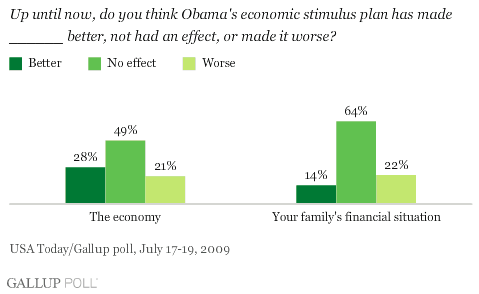
Nearly half of Americans (49%) say the stimulus plan passed earlier this year has had no effect on the economy thus far, while 28% say it has made the economy better and 21% say it has made the economy worse. Americans are even more likely, at 64%, to say the economic stimulus plan has had no effect on their family's financial situation, while 14% say it has made their family's financial situation better and 22% say it has made their financial situation worse.
Americans' long-term expectations of the economic stimulus plan are more positive. Nearly half (48%) say the stimulus will make the economy better in the long term, rather than having no effect (19%) or making it worse (31%). Americans express greater skepticism about the stimulus' long-term effect on their families, with responses about evenly split between "better" (35%) and "worse" (34%), and another 28% expecting the stimulus to have no effect.
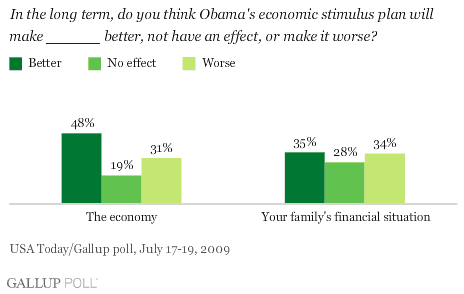
More Politics Than Pocketbook
An examination of the results to these questions by subgroup suggests Americans' views are likely driven more by politics than by economics. Republicans are far more likely than Democrats to say the stimulus has made and will make both the economy and their family's financial situation worse, and Democrats are far more likely than Republicans to say the opposite. Independents are evenly divided about the economic stimulus' effect on the economy, for better or for worse, to date or in the future. They are slightly more negative than positive about its effect on their own families.
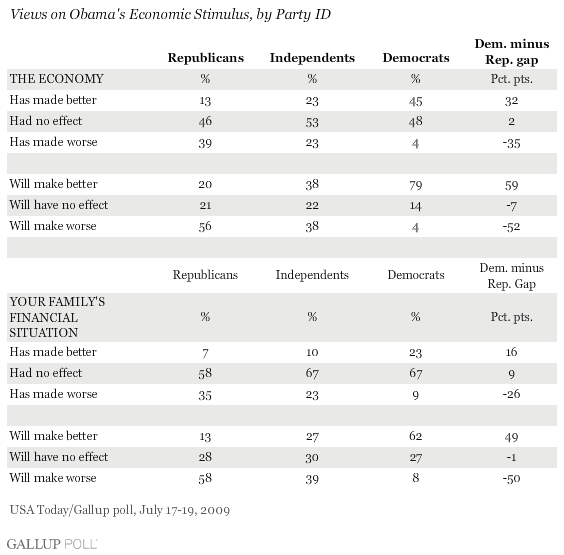
These views likely relate to Americans' highly partisan views on the amount of government spending and expansion of government power in President Obama's proposals to date.
Among income groups, Americans making $20,000 or less per year tend to be more positive about the effects of the economic stimulus than those in higher income categories, though the variation is not always steady or linear.
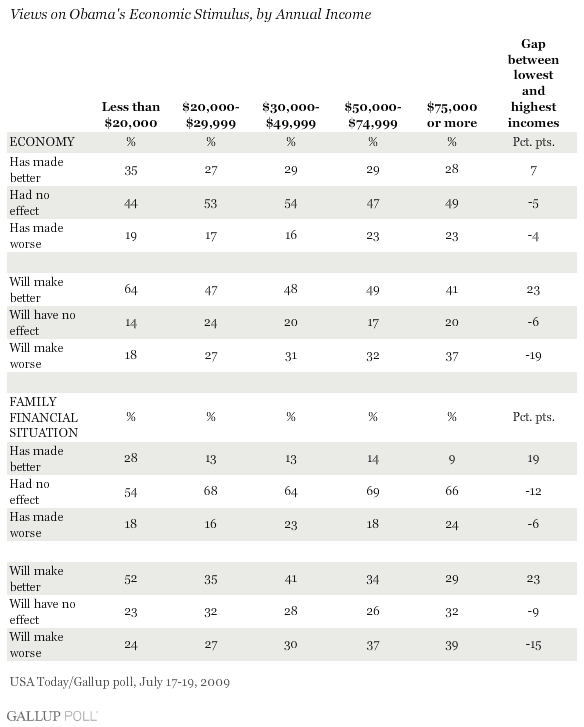
Long-Term Time Horizon
When asked in an open-ended question how long they expect it to be before the economy starts to recover, 30% now say five years or more, up from 19% in February but similar to the 28% who said so in December. Overall, 68% of Americans now expect it to take two years or more before the economy starts to recover, little changed from 71% in February. One in four (27%) now expect it to take less than two years, about the same as the 24% in February who said this.
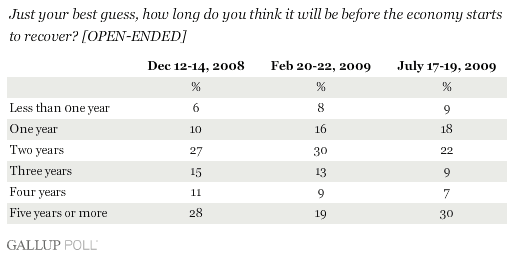
Bottom Line
Gallup data regarding the economic stimulus reveal that Americans for the most part are not yet seeing tangible effects of the plan, either in their own lives or in the economy more broadly. About half of Americans (48%) expect the stimulus to ultimately make the economy better, and 35% say so about their own family situations. But that leaves half or more who expect the plan either to have no effect or to make things worse. These views relate strongly to one's politics and to a lesser degree to one's economic status.
Overall, Americans are about as hopeful for a speedy economic turnaround as they were in February, but more inclined to say it could take five years or more.
Survey Methods
Results are based on telephone interviews with 1,006 national adults, aged 18 and older, conducted July 17-19, 2009. For results based on the total sample of national adults, one can say with 95% confidence that the maximum margin of sampling error is ±3 percentage points.
Interviews are conducted with respondents on land-line telephones (for respondents with a land-line telephone) and cellular phones (for respondents who are cell-phone only).
In addition to sampling error, question wording and practical difficulties in conducting surveys can introduce error or bias into the findings of public opinion polls.
